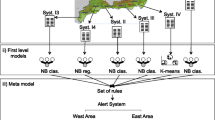Abstract
In this paper, we address the problem of flood prediction in complex situations. We present an original solution in order to achieve the main goals of accuracy, flexibility and readability. We propose the SM2D modular data driven approach that provides predictive models for each sub-process of a global hydrological process. We show that this solution improves the predictive accuracy regarding a global approach. The originality of our proposition is threefold: (1) the predictive model is defined as a set of aggregate variables that act as classifiers, (2) an evolutionary technique is implemented to find best juries of such classifiers and (3) the flood process complexity problem is addressed by searching for sub-models on sub-processes identified partly by spatial criteria. The solution has proved to perform well on flash flood phenomena of tropical areas known to be hardly predictable. It was indeed successfully applied on a real caribbean river dataset after both preprocessing and preliminary analysis steps presented in the paper.
Access this chapter
Tax calculation will be finalised at checkout
Purchases are for personal use only
Preview
Unable to display preview. Download preview PDF.
Similar content being viewed by others
References
Back, T., Fogel, D.B., Michalewicz, Z. (eds.): Handbook of Evolutionary Computation. IOP Publishing Ltd., Bristol (1997)
Breiman, L.: Random forests. Machine Learning 45, 5–32 (2001)
Corzo, P., Perez, G.: Hybrid Models for Hydrological Forecasting: Integration of Data-Driven and Conceptual Modelling Techniques. Taylor & Francis Group (2009)
Holland, J.H.: Adaptation in Natural and Artificial Systems. The University of Michigan Press (1975)
Matthews, B.W.: Comparison of the predicted and observed secondary structure of t4 phage lysozyme. Biochimica et Biophysica Acta 405(2), 442–451 (1975)
Quinlan, J.R.: C4.5: Programs for Machine Learning. Morgan Kaufmann (1993)
Rocha, M., Neves, J.: Preventing premature convergence to local optima in genetic algorithms via random offspring generation. In: Imam, I., Kodratoff, Y., El-Dessouki, A., Ali, M. (eds.) IEA/AIE 1999. LNCS (LNAI), vol. 1611, pp. 127–136. Springer, Heidelberg (1999)
Segretier, W., Clergue, M., Collard, M., Izquierdo, L.: An evolutionary data mining approach on hydrological data with classifier juries. In: IEEE Congress on Evolutionary Computation, pp. 1–8. IEEE (2012)
Segretier, W., Collard, M., Clergue, M.: Evolutionary predictive modelling for flash floods. In: IEEE Congress on Evolutionary Computation (to appear, 2013)
Sene, K.: Hydrometeorology: Forecasting and Applications. Springer (2010)
Solomatine, D.P., Price, R.K.: Innovative approaches to flood forecasting using data driven and hybrid modelling. In: Proceedings of the 6th International Conference on Hydroinformatics, pp. 1–8 (2004)
Solomatine, D.P., Siek, M.B.: Modular learning models in forecasting natural phenomena. Neural Networks: The Official Journal of the International Neural Network Society 19(2), 215–224 (2006)
Solomatine, D.P., Xue, Y.: M5 Model Trees and Neural Networks: Application to Flood Forecasting in the Upper Reach of the Huai River in China 9(6), 491–501 (2004)
Toth, E.: Classification of hydro-meteorological conditions and multiple artificial neural networks for streamflow forecasting. Hydrology and Earth System Sciences 13(9), 1555–1566 (2009)
Author information
Authors and Affiliations
Editor information
Editors and Affiliations
Rights and permissions
Copyright information
© 2013 Springer-Verlag Berlin Heidelberg
About this paper
Cite this paper
Segretier, W., Collard, M. (2013). SM2D: A Modular Knowledge Discovery Approach Applied to Hydrological Forecasting. In: Fürnkranz, J., Hüllermeier, E., Higuchi, T. (eds) Discovery Science. DS 2013. Lecture Notes in Computer Science(), vol 8140. Springer, Berlin, Heidelberg. https://doi.org/10.1007/978-3-642-40897-7_13
Download citation
DOI: https://doi.org/10.1007/978-3-642-40897-7_13
Publisher Name: Springer, Berlin, Heidelberg
Print ISBN: 978-3-642-40896-0
Online ISBN: 978-3-642-40897-7
eBook Packages: Computer ScienceComputer Science (R0)




